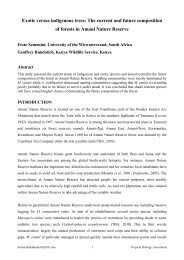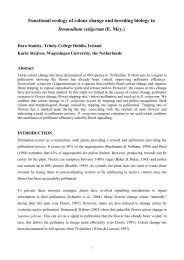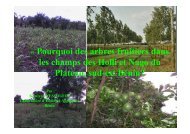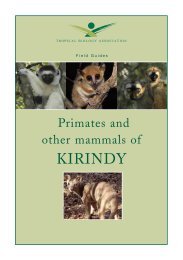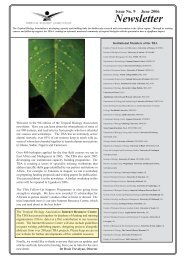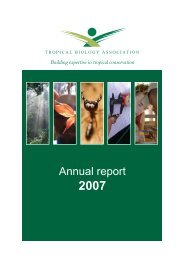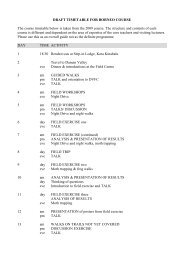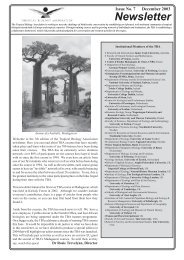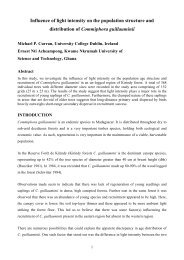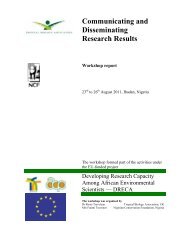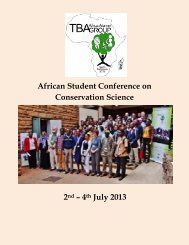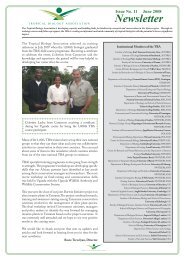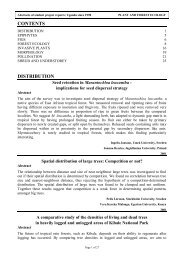Download TAAG Book of Abstracts - Tropical Biology Association
Download TAAG Book of Abstracts - Tropical Biology Association
Download TAAG Book of Abstracts - Tropical Biology Association
Create successful ePaper yourself
Turn your PDF publications into a flip-book with our unique Google optimized e-Paper software.
Community Perception <strong>of</strong> Climate Change and Altered<br />
Usage Patterns <strong>of</strong> Non-Timber Forest Products by<br />
Forest-Dependent Communities around New-Dabaga<br />
Ulonghambi, Tanzania<br />
Upendo Msalilwa 1 , Suzana Augustino 2 and Peter<br />
Reuben Gillah 2<br />
1 Tanzania Forestry Research Institute, P.O. Box 1854,<br />
Morogoro, Tanzania<br />
2 Sokoine University <strong>of</strong> Agriculture, P.O. Box 3014,<br />
Morogoro, Tanzania<br />
Email for correspondence: upemsa@gmail.com<br />
Abstract<br />
Climate change is currently one <strong>of</strong> the greatest<br />
environmental challenges facing humankind. We<br />
investigated the local peoples’ perceptions <strong>of</strong> climate<br />
change and the use <strong>of</strong> NTFPs as a response to perceived<br />
change around the New Dabaga-Ulongambi Forest<br />
Reserve (NDUFR). Primary data were obtained using<br />
Participatory Research Approaches including focus<br />
group discussions and household questionnaires.<br />
Climate data from 1980 to 2011 show that temperature<br />
has increased, while rainfall is characterized by large<br />
inter-annual variability, with peak rains in 1997 and<br />
2010. The local peoples’ perceptions <strong>of</strong> climate change<br />
were in line with the available climatic data records. In<br />
response to climatic changes, communities living around<br />
the NDUFR use more than one strategy to cope with<br />
change; 43% <strong>of</strong> respondents admitted to use NTFPs at<br />
households for food as well as selling to generate<br />
income. Mixed cropping and on-farm tree planting were<br />
other adaptations strategies helping people to improve<br />
their livelihoods. Awareness creation on short-term<br />
crops with short rotation, establishment <strong>of</strong> beekeeping<br />
enterprises and formulation <strong>of</strong> tree planting groups are<br />
needed to sustain peoples’ livelihoods. Sustainable<br />
harvesting <strong>of</strong> NTFPs is crucial so as to reduce<br />
overexploitation <strong>of</strong> forest resources.<br />
Keywords: Perceptions, climate change, adaptation and<br />
Non-timber Forest Products.<br />
Environmental and Socio-cultural impacts <strong>of</strong> Tourism<br />
on Livelihood <strong>of</strong> Indigenous Communities living along<br />
the Tourist Road from Makuyuni to Ngorongoro gate in<br />
Arusha, Tanzania<br />
Masinda, Maswet Crescent<br />
University <strong>of</strong> Dodoma, P. O Box 295, Dodoma-Tanzania<br />
E-mail: sweatmn@yahoo.com<br />
Abstract<br />
The study assessed social-cultural and environmental<br />
impacts <strong>of</strong> tourism on livelihood <strong>of</strong> indigenous societies<br />
along 130 km tourist road from Makuyuni to<br />
Ngorongoro gate in Arusha, Tanzania. Questionnaires<br />
structured around the Likert scale, focused group<br />
discussion, interviews and documentation review<br />
methods were used to investigate community<br />
perceptions towards tourism impacts. Qualitative and<br />
quantitative information from 135 respondents were<br />
gathered, measured, and interpreted. All the<br />
respondents agreed that tourism activities were the<br />
main cause <strong>of</strong> socio-cultural and environmental changes<br />
in the area. About 70% were more concerned that<br />
tourism activities were causing cultural distortion,<br />
commoditization <strong>of</strong> culture, shortage <strong>of</strong> land, health<br />
problems, increase cost <strong>of</strong> living, and overutilization <strong>of</strong><br />
natural resources. However, 62% <strong>of</strong> the respondent<br />
perceived tourism as a tool that brings people <strong>of</strong><br />
different cultures together provides direct contact<br />
between the two parties, understanding between<br />
nations, and leads to employment, financial gain for<br />
individuals and environmental conservation. The study<br />
concludes that despite all the negative and positive<br />
impacts <strong>of</strong> tourism on the area, it is not yet clear<br />
whether the benefits outweigh the costs in perspectives<br />
<strong>of</strong> the local people. A reason for this vagueness is that<br />
52% <strong>of</strong> respondents favoured tourism while 48%<br />
condemned it as a dirty industry.<br />
Keywords: Tourism, Environment, Livelihood, Social<br />
Cultural heritage, Ngorongoro<br />
<strong>TAAG</strong> First African Student’s Conference, Nairobi. 2-4 July, 2013 54



